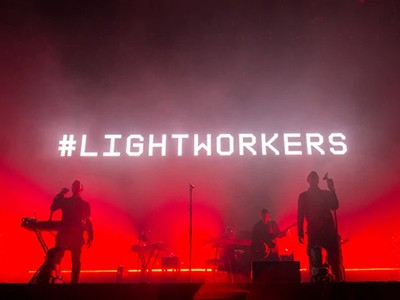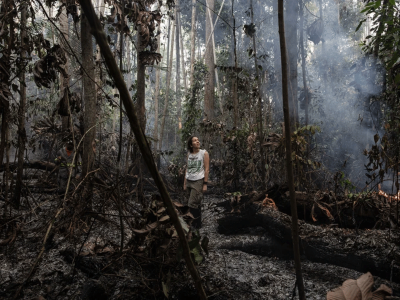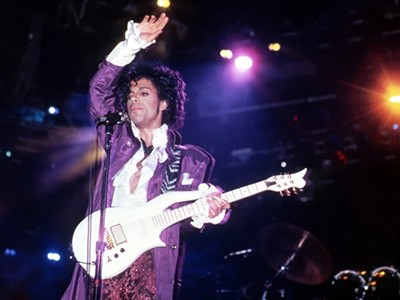In 2019, Carly McLachlan took a name from Mark Donne, a producer with the band Large Assault. The BRIT award-winning, UK trip-hop band’s music — a fusion of hip-hop and electronica — and environmental activism have been pushing music-industry boundaries for 25 years. Donne needed to know whether or not McLachlan, who directs the part of the Tyndall Centre for Local weather Change Analysis situated on the College of Manchester, UK, would assess the carbon footprint of Large Assault’s touring practices and, in doing so, create an motion plan to kick-start change throughout the live-music sector.
Dwell music is a serious carbon sinner — however it could possibly be a catalyst for change
After interviewing the band and its manufacturing staff, holding workshops with {industry} professionals and crunching numbers on emissions, in June 2021, McLachlan and her staff printed the Tremendous-Low Carbon Dwell Music street map for the UK live-music sector (see go.nature.com/3xdyq5j). The 17-page report is among the first makes an attempt not solely to evaluate the carbon prices of the UK’s live-music {industry}, but additionally to counsel clearly outlined and measurable targets that the sector may work in the direction of to fulfill the intention of the Paris local weather settlement to restrict world warming to 1.5 °C. The street map’s key message is “that super-low carbon practices can solely be delivered if they’re central from the inception of a tour”.
Large Assault used the street map to ship what the band hopes was the lowest-carbon live performance of its measurement to this point, and one which “fires a beginning pistol for the music {industry} to embrace the a number of alternatives for change”, the band mentioned in an announcement. On 25 August, some 34,000 folks swarmed Clifton Down, a 162-hectare public park in Bristol, UK, the band’s house city, to attend the Act 1.5 Local weather Motion Accelerator all-day occasion.
Utilizing the targets within the street map, the band and Act 1.5 staff launched modifications to how the occasion dealt with energy, waste, journey and meals. McLachlan and her analysis staff plan to make use of information from Act 1.5 to evaluate what may develop into new requirements for a decarbonized live-music {industry}. Her staff will use interviews with occasion organizers, carried out earlier than and after the occasion, to see what labored and what didn’t. The researchers plan to publish their findings, together with a quantitative evaluation of the occasion, in a report on the finish of this 12 months. However even with out the report, if the viewers left the live performance blissful, that itself could possibly be key to persuading the {industry} that these tutorial suggestions will not be solely main, but additionally sensible.
“Should you counsel one thing, and folks say, ‘Nicely that might by no means occur,’ however then they will see it already has occurred, it simply unlocks a completely completely different mind-set,” McLachlan says.
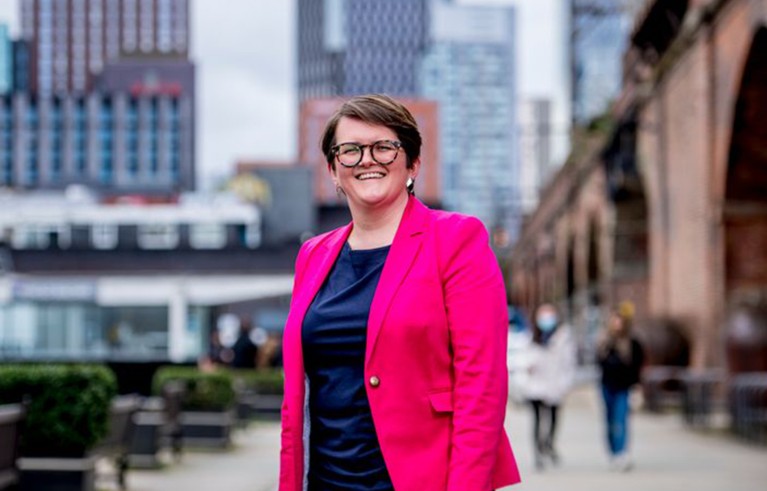
Carly McLachlan’s staff produced a super-low carbon street map for reside music occasions.Credit score: College of Manchester
Your entire live performance was powered by renewable power and batteries, with LED and low-energy lights prioritized for all stage and creative lighting. Electrical vans had been used to assemble and transfer batteries on website. The occasion used a pre-existing competition infrastructure and one of many largest batteries ever supplied for a UK music occasion. This saved an estimated 2,000 litres of generator diesel, slashing 5,340 kilograms of carbon emissions.
To lower the carbon value of viewers journey, which is assumed to make up round 41% of an occasion’s whole carbon footprint, practice travellers who booked by the Practice Hugger app got particular incentives. These included free transfers from the town’s two most important stations to the occasion by electrical bus, and folks travelling from outdoors Bristol obtained entry to a particular Practice Hugger visitor bar, which included separate bogs. Meals choices had been 100% plant primarily based and supplied by native suppliers, and the occasion had a zero-waste-to-landfill coverage.
The band partnered with the native practice community, Nice Western Railway, to supply 5 additional trains after hours for followers travelling house. Now, the band is working with native organizers to develop a renewable-energy infrastructure at Clifton Down — an influence substation and distribution system — to energy future occasions. “Large Assault are actually good at legacy,” says McLachlan. “These large artists are shifting issues alongside every time; something that they depart makes it simpler for the subsequent lot to ask for the subsequent factor.”
The proper match
From her workplace on the Tyndall Centre, McLachlan leads a staff of about 50 pure scientists, engineers, social scientists and economists who analysis local weather coverage, with tasks starting from renewable-energy efforts led by the group to UK tidal power and the round financial system.
The dedication Large Assault has made to assist produce the street map after which take a look at its effectiveness is precisely what McLachlan appears to be like for in a collaboration. She appreciates the band’s want to problem the established order: they’re “individuals who don’t need you to jot down them a report that sits on a shelf, however they actually need to have a go at making change”, she says.
‘Who will defend us from seeing the world’s largest rainforest burn?’ The psychological exhaustion confronted by local weather scientists
Donne, who’s now lead producer of Act 1.5, says that McLachlan was beneficial to the band by one in all her former colleagues, Alice Bell, who’s head of coverage in local weather and well being at Wellcome, a charitable funding group in London. Large Assault “needed to set a transparent normal to stick to that was Paris 1.5 suitable”, says Donne. “Nearly all the opposite schemes within the sector didn’t” meet that normal, he says. To do that, the staff “wanted scientists and analysts to ensure the work we constructed our personal tasks on was substantive, authoritative and credible”. Donne says that McLachlan “is a pleasure to work with: at all times clear, at all times analytical, at all times frank”. He particularly appreciates the worth that comes from the social-science component of the challenge. “McLachlan and [road map co-author Chris] Jones are excellent at taking a look at knock-on results and the potential negatives” of initiatives that the band considers, he says.
“The band knew we’d give it to them straight and never sugar-coat it,” McLachlan says, including that good stakeholder engagement depends on constructing and sustaining sincere relationships which are constructive and collaborative. “We’re a essential good friend, however in a jolly packet,” she says of her staff’s method.
The challenge’s scope additionally appealed to her. “It’s an space that you simply would possibly assume is sort of arduous to decarbonize — artists flying all over the world taking a great deal of stuff with them — how are you going to get carbon out of that? Should you can reveal the way to do it in a troublesome sector like this, then couple that with the attain of Large Assault — it may be highly effective.”
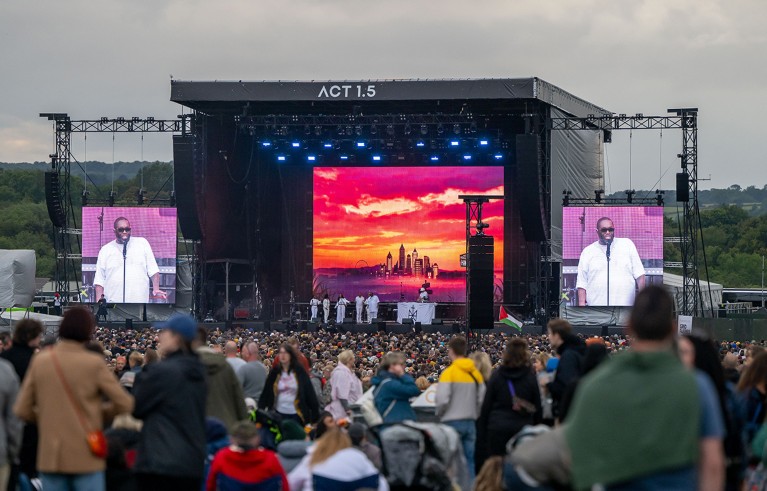
At their Act 1.5 live performance occasion in Bristol on 25 August, the band Large Assault powered its present utilizing solely renewable power sources and batteries and inspired followers to reach by practice or electrical bus.Credit score: Matthew Horwood/Getty
Jones, a information change fellow on the Tyndall Centre who has labored with McLachlan for greater than a decade, says; “She’s generated a fame for not pulling any punches with the form of challenges we face on local weather change.” He notes that there are a lot of completely different views and priorities in reside occasions, past creating music and turning a revenue. “So, there could be tensions and completely different camps can emerge. Carly is excellent at constructing a collective response by bringing it again to the frequent floor.”
Listening to decrease emissions
McLachlan joined the Tyndall Centre in 2003 as a analysis assistant and in 2005 she began a PhD there that examined controversies for growing renewable-energy tasks. She was drawn to the centre’s interdisciplinary setting and dealing straight with companies and industries, and, after a short stint in {industry}, she rejoined the centre as a knowledge-exchange fellow. McLachlan loved the problem and tempo of the work. “You’re operating from one short-term contract to a different,” she says. “I discovered that basically thrilling.”
Her present work focuses on decarbonizing cities. In 2019, McLachlan labored with the Higher Manchester Mixed Authority (GMCA), the physique that oversees the broader metropolis area, to assist Manchester develop into the primary UK metropolis area to set science-led emission-reduction targets in step with the Paris settlement, at a price sooner than the nationwide goal.
The neuroscientist previously often called Prince’s audio engineer
McLachlan says that since 2019, greater than 250 councils have used the carbon-budget device created by the GMCA challenge to set or inform their very own targets. “It’s not a silver bullet, however I do really feel proud that we made the device freely out there,” says McLachlan. “It’s helped folks assume a bit extra about near-term emissions reductions relatively than the 2050 framing of reductions,” she says, referring to the UK authorities’s authorized dedication to cut back its web greenhouse-gas emissions to zero by 2050. Mark Atherton, director of setting on the GMCA, says McLachlan’s “talent at translating advanced analysis into actionable insights make her a useful accomplice”.
McLachlan thinks that acknowledging what you don’t know is crucial to an efficient collaboration. “It’s a must to be prepared to say that you simply don’t perceive. Once you do that, you begin to study to talk in a approach that extra folks can perceive you and the place you’re coming from.”
A planet secure from hurt
Working with Large Assault is “tremendous inspiring”, McLachlan says, due to the band’s sheer persistence. When the group learnt that native trains would cease earlier than the occasion completed, “They are saying ‘effectively then, let’s get some trains operating. And who do now we have to talk to make that occur?’ Should you may bottle that, throughout all ranges of local weather motion, that’s what we’d like.”
Donne says extra work must be performed to scale up the modifications made at Act 1.5 to make them sensible for different artists and occasions. For instance, as a result of diesel turbines are cheaper and ubiquitous within the {industry}, there was an additional value to not utilizing them — shared on this case by the band and the battery suppliers. “Central governments have to step up and do extra to incentivize decarbonization,” says Donne.
Some critics say that performers ought to cease touring altogether. However McLachlan hopes this work with Large Assault will encourage the {industry} to make important modifications that may defend each the facility of reside music and the planet. There’s proof it already has.
The Act 1.5 staff is in talks with British rock band The Smile, shaped by some members of the band Radiohead, to use elements of the street map to its upcoming tour actions. And a spokesperson for REVERB, an environmental non-profit group in Portland, Maine that helps artists comparable to Billie Eilish and Dave Matthews Band to cut back their excursions’ environmental impression, says that the Tyndall Centre’s work on low-carbon music has “influenced and impressed” its work.
“I take a look at it from the angle of, what’s the world that we are attempting to guard?” McLachlan says. “I believe reside music is a very stunning component of being human.”



